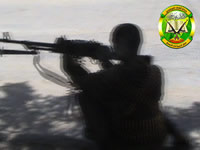|
|
|
Image of a Shabaab fighter from the terror group’s website. |
A senior Shabaab military commander was murdered after attending a mosque in the port city of Kismayo in the Somali South.
Unidentified gunmen shot and killed Sheik Da’ud Ali Hassan after evening prayers, an official from the al Qaeda-linked Shabaab confirmed.
Hassan was the military commander in the town of Dhobley and was a senior commander in the Ras Kamboni Brigade, which recently merged with Shabaab. Shabaab runs training camps for its fighters and suicide bombers in the town of Dhobley, which is close to the border with Kenya.
Shabaab has rounded up suspects in the death of Hassan but has not identified any culprits. It is likely the attack was carried out by members of the rival Islamist group Hizbul Islam.
The Ras Kamboni Brigade split from Hizbul Islam in February 2010 and pledged allegiance to Shabaab and al Qaeda. Hassan Turki confirmed the merger of the Ras Kamboni Brigade with Shabaab and said he made the decision to aid in “the unification of all Mujahidins and Muslims.”
The split angered some in Hizbul Islam. Just days after Turki’s announcement, Bare Ali Bare, a deputy commander of the Ras Kamboni brigade, denied that his group had joined Shabaab.
Shabaab quickly silenced Bare by executing him at the Bakara market in central Mogadishu. No person has since stepped forward to deny that the Ras Kamboni Brigade has joined Shabaab.
The Ras Kamboni Brigade’s defection from the Hizbul Islam alliance was a heavy blow to the latter group, and was a boost to Shabaab. The Ras Kamboni Brigade had formed a major part of Hizbul Islam’s forces in the Somali South.
Hizbul Islam is a radical Islamist group that is led by Sheikh Hassan Dahir Aweys, who is wanted by the US for his ties to al Qaeda. Aweys co-led the Islamic Courts in 2006 until the group was ousted from power during the Ethiopian invasion in December 2006. Last September, Aweys advocated for more suicide attacks in the country, just days after suicide bombers struck an African Union base in Mogadishu.
Hizbul Islam was created in January 2009 with the merger of four separate Islamic groups: Aweys’ Alliance for the Re-Liberation of Somalia-Eritrea; the Ras Kamboni Brigade; Jabhatul Islamiya (the Islamic Front); and Anole.
Although Shabaab and Hizbul Islam sought to merge forces during the summer of 2009, the alliance was frayed by local disputes between factions of the two organizations. Relations between Shabaab and Hizbul Islam worsened after the groups began to battle in Kismayo over control of the southern port city.
Clashes between Shabaab and Hizbul Islam have persisted in southern Somalia, but Shabaab has had the upper hand. Despite the intra-Islamist fighting, the weak Transitional Federal Government, backed by thousands of African Union peacekeepers, controls only small enclaves within the capital of Mogadishu, and little else. A pro-government Sufi Islamist militia called Ahlu Sunnah Wal Jama’a controls some regions in central Somalia and often clashes with Shabaab and Hizbul Islam.









4 Comments
5 years from now the islamic insurgents of Somalia will dominate this country. It will be a haven for AQ and other groups.
I read that the Somali government begged the U.S for help but turned them down.
You could have prevented a new Afghanistan but perhaps you have no intention to do so?
The islamic insurgents of Somalia are puppets of AQ so they will be your next enemy…
Perhaps, nissonic, you could provide reference for this denied direct American support for the Somali government? As far back as I can remember – at lease in the last decade – the UN and African Union have done everything possible to prohibit any direct American involvement in Somalia.
nissonic,
damned if you do, damned if you don’t!
This is perhaps not the best site but there are more.
http://www.raxanreeb.com/?p=40808
Here is a quotation:
“The United States does not plan, does not direct, and does not coordinate the military operations of the TFG (transitional federal government) and we have not and will not be providing direct support for any potential military offensives,”